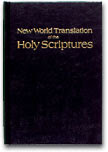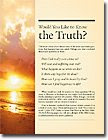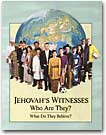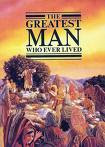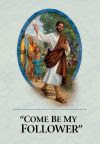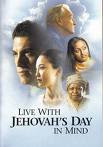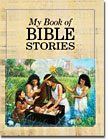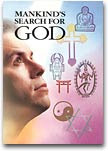Perhaps the most important day in ancient Israel was Atonement Day. On Atonement Day, the High Priest was to sacrifice animals for himself and all Israel. Then he was supposed to take two goats and stand before the Tent of Meeting. By lots, he was to choose one goat to be slaughtered and then the other goat would be sent off into the wilderness to carry the sins of the Israelites away. He was then to sacrifice a bull to cleanse himself. After this, he was supposed to take a fire holder full of burning coals along with handfuls of fine, perfumed incense and bring them inside the curtain. Thus, the High Priest entered into the Holy Place.-Leviticus 16:2-12
From there, the High Priest was to put the fire holder before Jehovah and put the incense upon the Ark of the Covenant. He would then take some of the blood of the bull and spatter it with his finger on the cover a specific number of times. Then he would do the same with the goat which he slaughtered. In this way, he must make atonement for the sins of the entire Israelite nation.-Leviticus 16:13-16
The High Priest was to then come out and spatter some of the blood of the bull and goat on the altar seven times, then put his hands on the other live goat and confess the sins of Israel over it. That is when the goat was to be sent away into the wilderness. (Leviticus 16:18-22) Although the ritual continues, this is about the gist of it. One question that may arise is why the need for so much blood? Because the power of atonement was in the blood for the reason that the life was in the blood. If there was no blood, there would be no life.-Levitucs 17:11
What did all this mean? All of this pointed to Jesus Christ and his sacrifice. In Hebrews 5:10 Jesus is said to be a High Priest. In Hebrews 9:11-28, Paul gives us an in depth description of the meaning of the Atonement Day. Atonement Day happened once a year, ever year, again and again because the effect of the blood of the bulls and goats could only cleanse temporarily. That is why Christ had to appear. His sacrifice was everlasting.
"However, when Christ came as a high priest of the good things that have come to pass, through the greater and more perfect tent not made with hands, that is, not of this creation, he entered, no, not with the blood of goats and of young bulls, but with his own blood, once for all time into the holy place and obtained an everlasting deliverance for us. For if the blood of goats and of bulls and the ashes of a heifer sprinkled on those who have been defiled sanctifies to the extent of cleanness of the flesh, how much more will the blood of the Christ, who through an everlasting spirit offered himself without blemish to God, cleanse our consciences from dead works that we may render sacred service to the living God?"-Hebrews 9:11-14
Christ, being a High Priest, did not have to enter into the literal tabernacle or temple to atone for us. He did that when he was resurrected. Even more, his own blood was sufficient to obtain an everlasting deliverance for us. Since the blood of bulls and goats had atoning properties, the blood of a perfect man do much more for us. Yes, only because Christ was "without blemish" could we obtain deliverance through him.
Now, all of this was a fulfillment of a very important prophecy in Isaiah 53. "Surely he has borne our sickness, and carried our suffering; yet we considered him plagued, struck by God, and afflicted. But he was pierced for our transgressions. He was crushed for our iniquities. The punishment that brought our peace was on him; and by his wounds we are healed." (Isaiah 53:4-5) The healing by his wounds is a spiritual healing. You see, we are all captives of sin. It rules over us as a king, making us unwilling slaves.-Romans 5:12, 21; 6:6; 7:21-25
Sin is a very powerful enemy. There is nothing that we can do about it. Sin can be likened to a disease that all men that have ever lived (besides Jesus Christ) have caught. The death rate is 100%. If anyone tries to convince us that they are sinless, then they are liars. (1 John 1:8-10) As said above, the only man to ever be sinless was the Lord Jesus. (1 Peter 2:22) Again, because of this and his sacrifice, Jesus is the only name on which we can be forgiven of our sins. (Acts 4:12) Why is this of such importance?
In the beginning, God created Adam a perfect man. There was only one thing that Adam could not do and that was eat from a certain tree in the center of the Garden of Eden. Unfortunately, Adam chose to disobey and became a sinner. After this, mankind needed a redeemer. Since Adam was a perfect man then there had to be a perfect man who could gain back what Adam lost. That man was Jesus. The Bible tells us, "For just as in Adam all are dying, so also in the Christ all will be made alive."-1 Corinthians 15:22
As we know, one Atonement Day was not enough for humans. Without Christ, the same ritual would have had to be repeated for all eternity. However, that changed upon his death and resurrection. Before discussing that, though, it is important to mention that in Israel, the slaughtering of the Atonement Day bull and goat was not enough. The blood had to be offered by the High Priest. Likewise, the same was true of Christ.
"For Christ entered, not into a holy place made with hands, which is a copy of the reality, but into heaven itself, now to appear before the person of God for us."-Hebrews 9:24If the blood of Christ had not had to be offered to God, he would have not had to be resurrected. His death would have been sufficient. However, someone--the High Priest--had to offer the blood to God. Since the High Priest was Jesus, he would have to be resurrected to approach God and offer his own blood. That is why Christ's resurrection was so important. His death alone was not enough. And, since he was the High Priest, only he could offer the shed blood.
When the Messiah offered the blood, another physical prophecy was fulfilled. When the human High Priest in Israel went to offer the blood, he would have to enter the Holy Place. This place was so holy that the priest could only enter once a year and then only when he had performed special rituals and when he was wearing special clothing. The place that Christ entered into was much better. The holy place made with hands on earth was only a copy of the real thing. Christ had to literally enter in front of God to offer his blood. The human priest only stood before the Ark of the Covenant, which was a symbol of God with Israel.
"Neither is it in order that he should offer himself often, as indeed the high priest enters into the holy place from year to year with blood not his own. Otherwise, he would have to suffer often from the founding of the world."-Hebrews 9:25-26
This Atonement Day occurred once a year, every year. As noted above, once was not enough because the blood offered was not perfect, human blood. But Christ, a perfect man, was able to enter only once. If not, as Paul says, Jesus would have had to suffer often from the founding of the world.
That was the first time Christ came. Next time he comes, none of this will be necessary. What will happen then? For some, his return will be a joyous time, for others, a grievous time. To be in the former group, we have to follow the command of the Apostle Peter who said, "Repent, and let each one of you be baptized in the name of Jesus Christ for forgiveness of sins, and you will receive the free gift of the holy spirit." (Acts 2:38) It is paramount that we put our trust in this sacrifice. Only by accepting this sacrifice can we be forgiven. (Ephesians 2:8-9) Even more, and this is the part that people seem to forget, more is required then just accepting this sacrifice. We have to have good works and follow Jesus. (John 3:36; James 2:26) After that, we have to stop sinning. We cannot continue to sin after learning the truth.-Romans 6:1-2; 1 Thessalonians 4:7-8; Hebrews 10:26-31
Christ is coming back one more time.
"The second time that [Christ] appears it will be apart from sin and to those earnestly looking for him for their salvation." (Hebrews 9:28) Christ is returning to save those of us who have put our faith in him. May all who the Father is drawing be part of that group.-John 6:44



